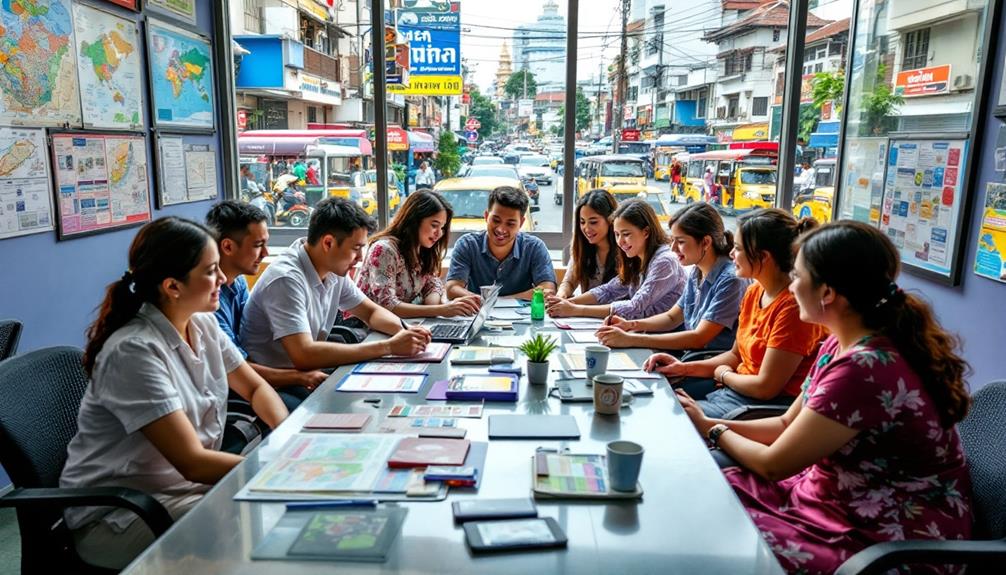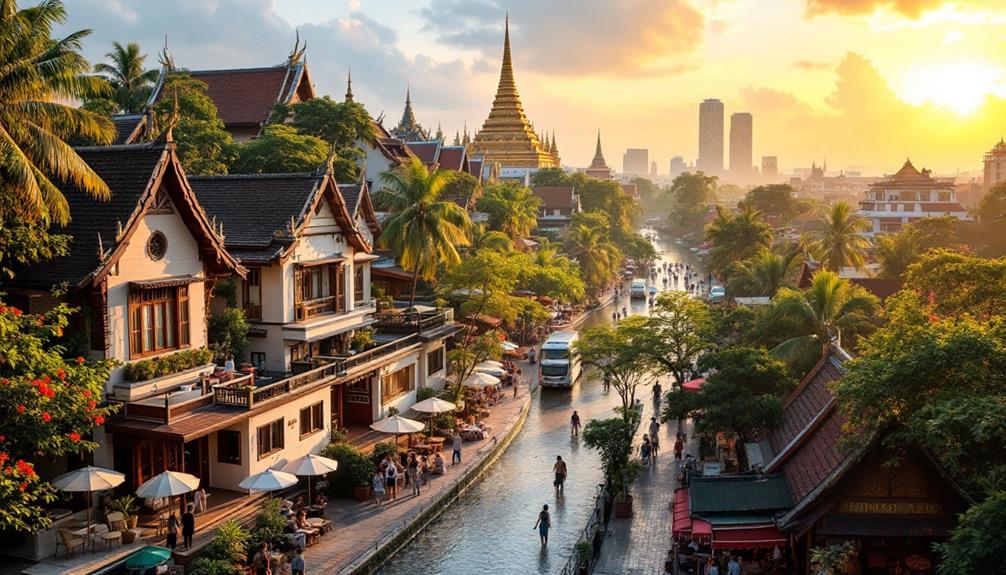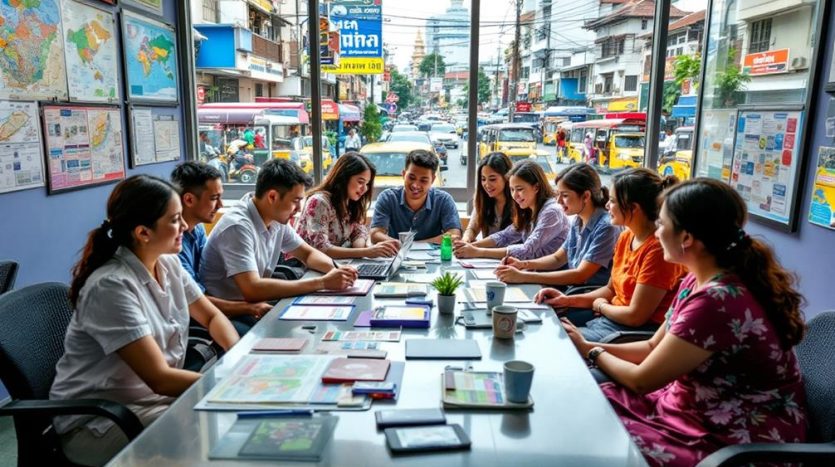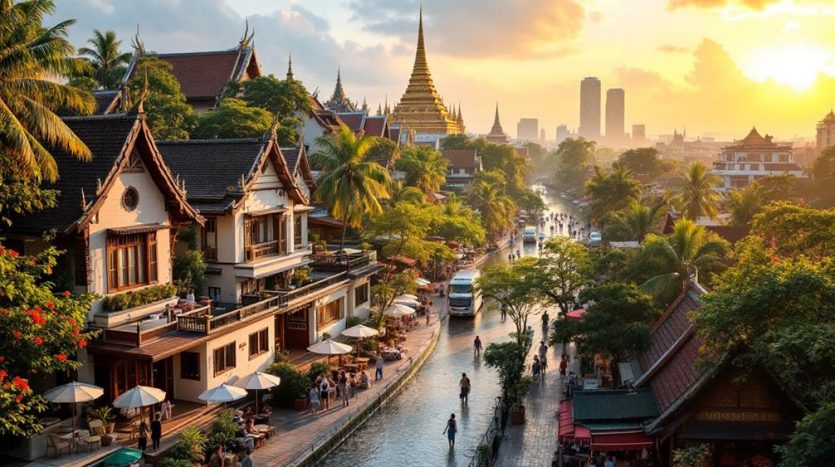Can Foreigners Live in Thailand?
Just as Marco Polo set out on his journeys, you might wonder about the feasibility of making Thailand your home. With its myriad of visa options—from retirement to student visas—foreigners have a pathway to reside in this vibrant country. But don't be fooled by the allure of affordable costs and cultural immersion; steering through the intricacies of legal documentation and local customs requires careful planning. So, what does it actually take to live comfortably in Thailand, and how do you guarantee you meet all the necessary requirements? The answers might surprise you.
Key Takeaways
- Foreigners can live in Thailand with appropriate visas like tourist, student, business, marriage, or retirement visas.
- Long-term residency is possible with a non-immigrant visa and work permit.
- Cost of living varies; urban areas are more expensive than rural settings.
- Employment requires a work permit; certain professions are restricted to locals.
- Language skills and cultural integration enhance the living experience in Thailand.
Visa Options for Foreigners

Maneuvering Thailand's visa options can seem complex, but understanding the available categories is essential for a smooth stay.
First off, let's tackle the array of visa types available for your grand Thai adventure. We've got tourist visas for those who feel like channeling their inner wanderlust without the commitment of a long-term relationship with Thai bureaucracy.
If you're a student, a student visa lets you hit the books while indulging in street-food adventures.
For those considering business ventures, the business visa is your golden ticket, but don't forget that elusive work permit—it's the key to legally earning your keep.
Now, if you've tied the knot with a local, a marriage visa guarantees you can continue the blissful union within Thailand's borders.
Retirement visas are like a golden parachute for those ready to relax in tropical comfort.
Long-term options? They're available, but they require a bit more elbow grease in the application process.
Don't despair, temporary permits are there for a quick fix if you're in between decisions.
Cost of Living Overview
Maneuvering the cost of living in Thailand requires a keen understanding of the financial landscape.
First, unpacking your monthly expenses is like opening a mystery box; it may surprise you. Depending on your lifestyle choices, you might find that the cost can either lead you to a life of luxury or have you counting bahts like you're at a game show.
Urban areas tend to be pricier than rural ones, offering diverse rental options but often at a higher cost. For those interested in budget-friendly dining, street food and local markets provide delicious and affordable meals.
Here's a legal eagle's guide to traversing the financial maze:
- Food and Groceries: Dining out is affordable, but if you're channeling your inner chef, local markets offer fresh ingredients without the Michelin-star price tag. Expect to spend between 5,000 to 10,000 baht monthly, depending on your appetite for Pad Thai and Tom Yum.
- Transportation: Public transport is your budget-friendly ally unless you've got a penchant for private rides. A monthly expense of 1,200 to 3,000 baht should cover your commuting adventures.
- Utilities and Internet: Essential, unless you're aiming for a hermit lifestyle. Electricity, water, and high-speed internet will cost you around 2,000 to 4,000 baht monthly.
Finding Accommodation

When you're looking to rent a place in Thailand, it's essential to understand the renting process, which typically involves a lease agreement, security deposit, and sometimes an agent's fee.
Make sure to verify the landlord's property ownership to avoid scams.
You'll want to familiarize yourself with the best neighborhoods for expatriates, each offering unique amenities, proximity to public transportation, and varying price points.
Renting Process Explained
Maneuvering the rental market in Thailand can initially seem intimidating, but understanding the key steps can simplify the process considerably.
Let's explore the essentials, so you can secure that dream pad without losing your shirt—or your sanity.
1. Lease Agreements: Picture them like prenups for apartments. You need to understand the terms, duration, and notice periods. Typically, leases run from six months to a year, but negotiating shorter or longer terms is possible.
Don't be shy about asking for a translation if your Thai isn't up to par.
2. Rental Deposits: Ah, the universal sign of commitment. Most landlords will ask for one to two months' rent as a deposit.
Make sure you get a receipt and keep it safe—like your grandma's lasagna recipe—since you'll want it back when you move out.
3. The Hunt: Use online platforms or local real estate agents to find listings.
Be prepared to act quickly; the good ones don't linger. Always inspect the property first. If you can't spot the bathroom from the kitchen, you might want to keep looking.
Best Neighborhoods Overview
Finding the right neighborhood in Thailand is essential for settling into your new home seamlessly. Imagine maneuvering through a labyrinth of bustling streets, deciphering the secret code of local amenities, and selecting a community atmosphere that suits your lifestyle. Let's get you sorted, shall we?
First, consider Sukhumvit in Bangkok. It's like the Swiss Army knife of neighborhoods—packed with international schools, eclectic eateries, and nightlife that could make a night owl blush.
If you prefer a more tranquil setting, Chiang Mai's Nimmanhaemin Road offers a laid-back vibe with a touch of bohemian flair. Perfect for those who like their coffee strong and their community even stronger.
Now, if you're a beach lover, Phuket's Patong might call your name. Yes, it's touristy, but who doesn't love the occasional beach party?
For a more refined experience, try Ao Nang in Krabi, where the sunsets are as dramatic as a soap opera.
Employment Opportunities
Charting the employment landscape as a foreigner in Thailand requires a clear understanding of local regulations and visa requirements. Before you dive headfirst into the Thai job market, let's unravel the red tape that can often feel like a game of bureaucratic hopscotch.
Whether you're a digital nomad or a corporate climber, here's what you need to know:
1. Work Permits: They're not just a piece of paper; they're your golden ticket to legally work in Thailand. Without one, you're as employable as a fish in a desert.
Make certain your work permit aligns with your visa type; mismatches can lead you into hot water, and trust us, you don't want to test the temperature. This is similar to the need for legal expertise when maneuvering property laws to guarantee compliance and understanding.
2. Job Market: From teaching English to engineering, Thailand offers a diverse job market. However, some professions are exclusively reserved for Thai nationals.
So, unless you're aspiring to be a professional elephant tamer, make certain your career choice is open to foreigners.
3. Networking: In Thailand, it's not just what you know, but who you know. Engage in local business groups and social events—think less suit-and-tie, more flip-flops and smiles.
Armed with this knowledge, you're ready to conquer Thailand's job market!
Healthcare Services

When considering healthcare services in Thailand, you'll need to weigh the benefits of public versus private options, as each offers distinct advantages and limitations.
For example, urban areas like Bangkok, known for high demand and amenities, may have better access to private healthcare facilities.
It's essential to secure adequate health insurance to cover potential expenses, especially since private facilities often require proof of such coverage.
Additionally, access to specialists may vary considerably between public and private healthcare settings, impacting your decision-making process.
Public vs. Private Options
How do you decide between public and private healthcare options when living in Thailand? It's a bit like choosing between public housing and private rentals. Each has its pros and cons, and your choice will depend on several factors.
1. Cost Considerations: Public hospitals in Thailand are often more affordable, akin to a cozy public housing setup. But, be prepared for longer waits, like standing in line for those delightful street food skewers.
Private hospitals, meanwhile, can feel like upscale private rentals—faster service but with a heftier price tag.
2. Quality and Comfort: If you're someone who prefers a Netflix-and-chill kind of comfort, private hospitals often offer more personalized care and English-speaking staff.
Public hospitals, while competent, may not always provide the same level of individual attention.
3. Accessibility and Wait Times: Public hospitals are more widespread, like ubiquitous tuk-tuks, but with greater demand.
Private hospitals, while fewer, can offer quicker appointments—think of them as those elusive taxis during rush hour.
Health Insurance Necessities
In choosing between public and private healthcare in Thailand, understanding your health insurance needs becomes a vital step. You've got options galore, like a buffet of health insurance types. There's public insurance for the budget-conscious, and private insurance for those who'd like a side of luxury with their check-up.
But here's the kicker: policy comparison is essential, unless you enjoy unexpected bills more than a spicy Tom Yum soup.
Start by evaluating your health needs. If you fancy living life on the edge with minimal coverage, public insurance might be your go-to. It's affordable but can involve long waits and fewer English-speaking staff.
On the other hand, private insurance offers faster service and English-speaking doctors, but it might cost you more baht than you'd spend on a year's worth of pad Thai.
When you're comparing policies, look for coverage details, exclusions, and, importantly, that fine print that could rival a Tolstoy novel in length.
Don't forget to check the provider network – you don't want to end up with a policy that covers only clinics in the middle of nowhere.
Access to Specialists
Maneuvering access to specialists in Thailand's healthcare system requires a strategic approach.
First, understand that these healthcare specialists are as coveted as the last slice of pizza at a party. To guarantee you don't miss out, follow this game plan:
- Secure a Referral: Just like trying to get into an exclusive club, you'll need an invite. Start with a general practitioner (GP) who can refer you to the specific medical consultations you need. This formal introduction can fast-track your access to specialists.
- Choose the Right Facility: Not all hospitals are created equal. Public hospitals may have longer wait times, while private ones are more like express lanes—but they might charge you a fee that'll make your wallet feel lighter. Choose based on urgency and budget.
- Prepare for Language Barriers: Brush up on your Thai or bring a translator app along. You don't want your request for a dermatologist to be misinterpreted as a plea for a dentist. It's all about clarity, folks!
Thai Language Basics
Mastering the basics of the Thai language is essential for any foreigner aiming to navigate life in Thailand effectively. You'll need more than just a smile to get by, though it helps.
Start with Thai pronunciation tips, as the tonal nature of the language can turn "kao" into rice, news, or even enter, depending on how you say it. It's like karaoke, but with life-altering consequences.
Begin your linguistic journey with essential phrases. Memorize "Sawasdee" (hello) and "Khop khun" (thank you) to warm up the locals. When you need help, "Chai mai?" (is it correct?) can be your go-to phrase, useful for everything from shopping to existential crises.
Also, "Mai pen rai" (never mind or no problem) is the Swiss Army knife of phrases, useful in almost any situation.
For procedural guidance, use language apps and online resources to practice pronunciation and vocabulary. Don't worry if you mix up your tones initially—it's all part of the fun.
Cultural Integration Tips

To effectively integrate into Thai culture, you should embrace local traditions by actively participating in festivals and respecting cultural norms.
Additionally, learning basic Thai language not only facilitates smoother daily interactions but also demonstrates respect for the host country.
Embrace Local Traditions
Engaging with local traditions in Thailand isn't just a way to enrich your experience; it's key to a successful cultural integration. Think of it as your legal obligation to fun and flavor.
First, immerse yourself in cultural festivals. These events aren't mere spectacles; they're your fast track to understanding a society rich in history and vibrancy. Plus, where else can you see elephants parading through city streets?
Next, indulge in traditional cuisine. It's a procedural step that's as delicious as it's essential. Sampling local dishes like Pad Thai or Tom Yum isn't just about satisfying your taste buds—it's about respecting the culinary artistry that defines a nation. And hey, if your mouth's on fire, it's just a rite of passage.
Finally, remember to dress the part. Respectful attire at temples or during festivals isn't just a suggestion; it's practically a clause in your unwritten expat contract.
Here's a quick checklist to get you started:
- Attend a Songkran festival—prepare to get soaked!
- Try a local cooking class—because you can't live on street food alone.
- Wear appropriate clothing—temple visits demand it.
Enjoy the ride, and remember: when in Rome, or Bangkok, do as the locals do!
Learn Basic Thai Language
As you commence your journey in Thailand, acquiring a basic understanding of the Thai language becomes more than just a cultural nicety—it's an essential part of your integration strategy.
Envision this: you're at a bustling Thai market, trying to haggle for a mango, and suddenly, your "Hello!" is met with blank stares. Why? Because knowing a few essential phrases like "Sawasdee" (hello) and "Khob khun" (thank you) can transform you from an outsider to a charming foreigner who tried.
Now, let's explore the legalese of Thai pronunciation tips. Mastering tones is vital; otherwise, you might accidentally call someone a horse instead of asking for their name.
"Ma" can mean "come," "horse," or "dog" depending on your tone. It's like having a conversation with a symphony—hit the wrong note, and you'll raise eyebrows.
To streamline your linguistic pursuits, focus on high-impact phrases. "Mai pen rai" (never mind) is your go-to for smoothing over any faux pas.
Education and Schools
Steering through the educational landscape in Thailand requires both diligence and an understanding of the local system.
You've got a smorgasbord of choices: international schools, language schools, and a variety of educational programs that might make your head spin faster than a tuk-tuk on a tight schedule.
Let's break it down:
- International Schools: These are your go-to for a curriculum resembling home. Expect a cocktail of cultural exchange and a healthy dose of extracurricular activities. They're perfect if you want your kids to avoid the "lost in translation" trap.
- Language Schools: If you're keen on picking up Thai or other languages, these schools offer flexible schedules and an environment where making mistakes is encouraged. Who knew mangling a language could be this fun?
- Local Educational Programs: For those looking to immerse in Thai culture, local schools provide a blend of academics and cultural insights. Just be prepared for the occasional mishap, like signing up for a dance class when you meant to learn the language.
Legal Considerations

Understanding the educational choices in Thailand sets the stage for tackling the legal considerations of living in the country. So, you've survived the Thai alphabet and now you're ready to plunge into the legal soup of living here. First up, let's talk work permits. Without one, you're like a fish out of water—flopping around with no legal way to earn a living. Securing a work permit requires a non-immigrant visa. Yes, it's a paper chase, but perseverance pays off.
Next, residency requirements. Imagine them as the ultimate reality show challenge, minus the cameras. Long-term residency isn't impossible, but it requires patience, legal paperwork, and a sprinkle of luck. Typically, you'll need a non-immigrant visa, a work permit (yep, that again), and proof of income or financial stability.
Here's a handy table to keep your legal ducks in a row:
| Legal Aspect | Requirement | Tip |
|---|---|---|
| Work Permit | Non-immigrant visa | Start early, avoid drama |
| Residency | Proof of financial stability | Keep receipts, be patient |
| Visa | Non-immigrant or retirement | Renew on time, avoid fines |
| Employment | Employer sponsorship | Choose wisely, work happy |
| Financial Proof | Bank statements, income reports | Numbers don't lie, be honest |
Now, go forth and conquer the legal jungle of Thailand!
Transportation and Travel
Maneuvering Thailand's transportation and travel landscape requires a keen understanding of both public and private options. You'll need a game plan that rivals a legal strategy, with an eye for detail and a dash of humor. To get around efficiently and sustainably, consider these key components:
1. Public Transportation: Thailand's public transportation is like a spicy Tom Yum soup—tantalizing yet unpredictable. Master the BTS Skytrain and MRT systems in Bangkok, and you'll zip through traffic like a local.
But beware the tuk-tuk charm; it's easy to overpay for the experience.
2. Navigating Cities: Whether you're in bustling Bangkok or the serene Chiang Mai, city navigation is an art. Grab a map, or better yet, download an app.
Keep safety precautions in mind—crosswalks are decorative, not functional.
3. Travel Tips and Eco-Friendly Travel: As you explore Thailand's tourist attractions and cultural festivals, aim for eco-friendly travel. Choose bicycles or electric tuk-tuks where possible.
And remember, sampling local cuisine is mandatory, but so is knowing when to say "mai pet" (not spicy).









